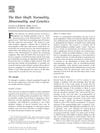 32 citations,
June 2000 in “Dermatologic Surgery”
32 citations,
June 2000 in “Dermatologic Surgery” Different factors help diagnose and treat hair loss accurately.
 14 citations,
April 2014 in “International Journal of Cosmetic Science”
14 citations,
April 2014 in “International Journal of Cosmetic Science” Acne is caused by multiple factors including oil production, bacteria, inflammation, and possibly diet and environment.
 1 citations,
April 2018 in “Revista da Sociedade Portuguesa de Dermatologia e Venereologia”
1 citations,
April 2018 in “Revista da Sociedade Portuguesa de Dermatologia e Venereologia” Hidradenitis suppurativa is a chronic skin condition more common in women, linked to genetics and lifestyle factors, and associated with various other health issues.
[object Object]  1 citations,
February 2013 in “InTech eBooks”
1 citations,
February 2013 in “InTech eBooks” Genetic mutations cause various hair diseases, and whole genome sequencing may reveal more about these conditions.
 January 2025 in “International Journal of Molecular Sciences”
January 2025 in “International Journal of Molecular Sciences” Psoriasis involves immune and genetic factors, and understanding these can improve treatments.
 August 2024 in “Applied Sciences”
August 2024 in “Applied Sciences” Plant extracts may help prevent or reverse hair graying.
 March 2024 in “Dermatology and therapy (Internet)”
March 2024 in “Dermatology and therapy (Internet)” Genetic factors could lead to personalized treatments for hair loss.
 2 citations,
October 1990 in “The Lancet”
2 citations,
October 1990 in “The Lancet” Some people have a genetic variation that makes them less effective at breaking down drugs.
5 citations,
February 2022 in “Seminars in cell & developmental biology” Recent findings suggest that genetic factors, immune system issues, and skin cell defects might contribute to the development of hidradenitis suppurativa.
 1 citations,
June 2023 in “Genes”
1 citations,
June 2023 in “Genes” Hair loss from Alopecia Areata is caused by both genes and environment, with several treatments available but challenges in cost and relapse remain.
Certain genes may influence hair loss differently in men and women.
 93 citations,
June 2001 in “The Journal of Clinical Endocrinology and Metabolism”
93 citations,
June 2001 in “The Journal of Clinical Endocrinology and Metabolism” Certain genetic variations in the AR and ERβ genes can affect androgen levels in women.
 1 citations,
January 2017 in “Evolutionary studies”
1 citations,
January 2017 in “Evolutionary studies” Different human traits like skin color and hair type vary between populations due to genetic adaptations to the environment.
 September 2023 in “Medicina-lithuania”
September 2023 in “Medicina-lithuania” The study suggests that analyzing DNA can help treat hair loss, but more research is needed.
 September 2017 in “Journal of Investigative Dermatology Symposium Proceedings”
September 2017 in “Journal of Investigative Dermatology Symposium Proceedings” Some people with the skin color loss condition, vitiligo, also develop the skin inflammation condition, lichen planus, possibly due to local trauma, sun damage, or genetic factors.
 20 citations,
December 2013 in “Clinical and Experimental Dermatology”
20 citations,
December 2013 in “Clinical and Experimental Dermatology” Smoking and drinking worsened hair loss in men with genetic hair loss, while eating and sleeping habits didn't; genetics played a bigger role than environment in hair loss.
2 citations,
December 2023 in “International journal of molecular sciences” Understanding keratinization is crucial for treating skin conditions like ichthyoses and psoriasis.
 October 2024 in “Comprehensive Health and Biomedical Studies”
October 2024 in “Comprehensive Health and Biomedical Studies” Smoking and alcohol worsen hair transplant results.
 16 citations,
December 2001 in “Dermatologic Therapy”
16 citations,
December 2001 in “Dermatologic Therapy” Alopecia areata has a complex genetic basis that was not fully understood as of 2001.
 8 citations,
November 2018 in “Australasian Journal of Dermatology”
8 citations,
November 2018 in “Australasian Journal of Dermatology” Frontal fibrosing alopecia in families shows similar signs to individual cases and may have a genetic link.
 2 citations,
November 2011 in “InTech eBooks”
2 citations,
November 2011 in “InTech eBooks” Most adrenal cortex tumors are benign and non-secreting, but proper diagnosis and treatment are important due to the rare possibility of cancer.
[object Object]  124 citations,
June 2002 in “Best Practice & Research Clinical Endocrinology & Metabolism”
124 citations,
June 2002 in “Best Practice & Research Clinical Endocrinology & Metabolism” Polycystic Ovary Syndrome likely starts in childhood and may be genetic and influenced by early hormone exposure.
 58 citations,
December 2020 in “Mayo Clinic Proceedings”
58 citations,
December 2020 in “Mayo Clinic Proceedings” The conclusion is that individual differences in COVID-19 severity are influenced by factors like age, sex, race, and genetics, which are important for personalized medicine.
 131 citations,
August 2004 in “Best Practice & Research in Clinical Obstetrics & Gynaecology”
131 citations,
August 2004 in “Best Practice & Research in Clinical Obstetrics & Gynaecology” The conclusion is that PCOS is caused by ovarian sensitivity to hormones and disrupted hormone control, possibly due to ovarian factors, and more research is needed.
 January 2009 in “Side effects of drugs annual”
January 2009 in “Side effects of drugs annual” Some blood-thinning medications can increase the risk of bleeding, and certain factors like genetics and other health conditions affect their safety and effectiveness.
 11 citations,
March 2001 in “Clinics in Dermatology”
11 citations,
March 2001 in “Clinics in Dermatology” Hair microscopy is useful for diagnosing hair disorders, but clear definitions are needed for accurate genetic analysis.
 May 2022 in “Journal of Education, Health and Sport”
May 2022 in “Journal of Education, Health and Sport” Skin diseases like psoriasis, lupus, and others can increase heart disease risk due to factors like chronic inflammation and genetic susceptibility.
 4 citations,
September 2012 in “Clinical Pharmacology in Drug Development”
4 citations,
September 2012 in “Clinical Pharmacology in Drug Development” Different drug doses approved in Japan and the U.S. are not mainly due to different clinical responses, and ethnic factors should be considered in setting drug doses.
 1 citations,
January 2010 in “Elsevier eBooks”
1 citations,
January 2010 in “Elsevier eBooks” Any drug can cause skin reactions, but antibiotics, NSAIDs, and psychotropic drugs are more common, with some reactions being life-threatening.
 July 2024 in “Clinical Cosmetic and Investigational Dermatology”
July 2024 in “Clinical Cosmetic and Investigational Dermatology” Certain immune cells are linked to non-scarring hair loss, suggesting potential for immune-targeted treatments.



























